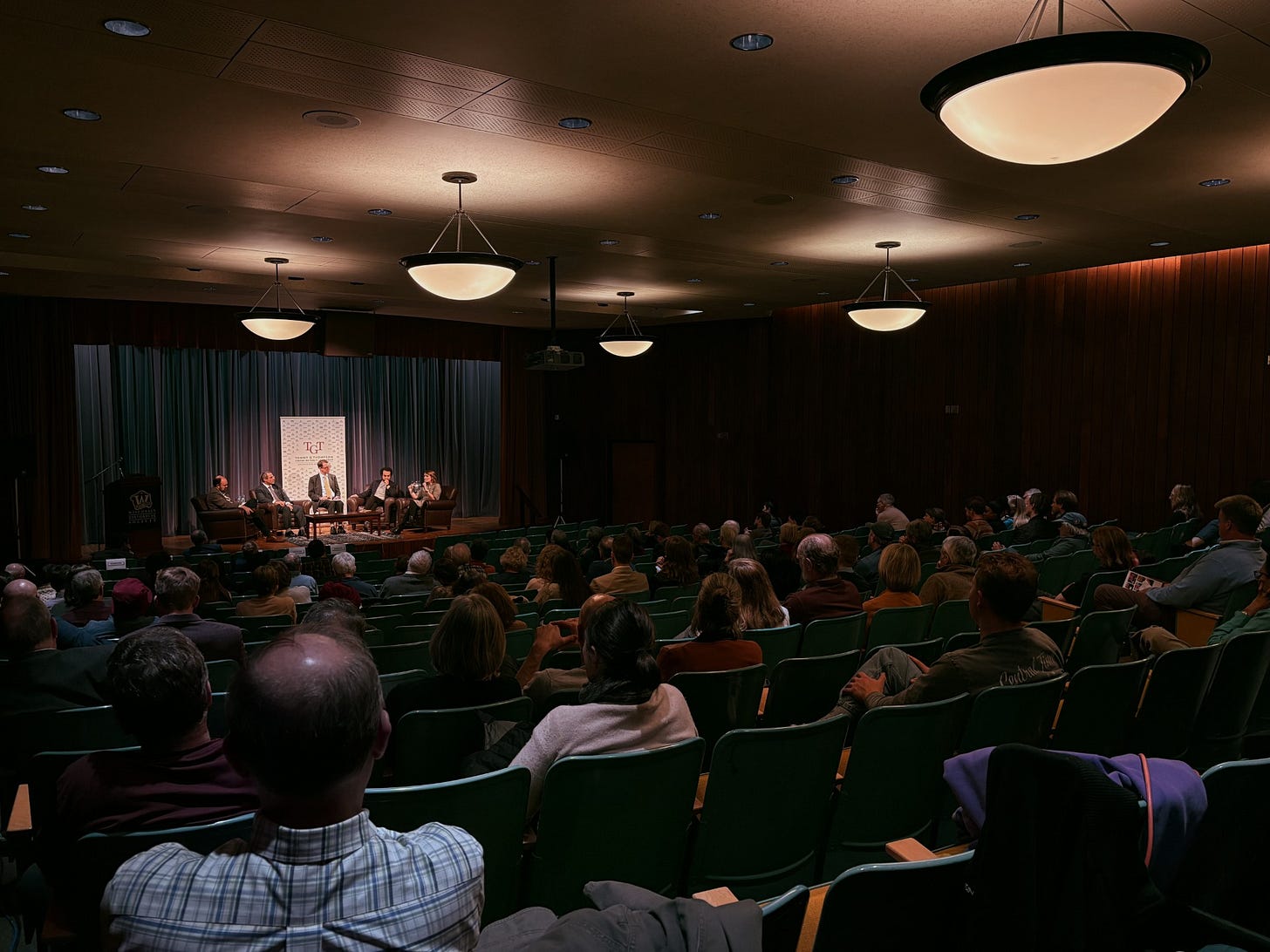Thompson Center Hosts Conversation on Faith and Politics
Panelists came together to discuss how religious people should approach politics in the modern world
In an era when disagreement too often leads to division, discourse between political perspectives is increasingly valuable. On October 22nd, the Tommy G. Thompson Center on Public Leadership hosted Moral Compasses: A Discussion on Faith and Political Values.
Moderated by Professor Alex Tahk, the center’s director, the event featured four panelists with distinct religious and political perspectives: Ross Douthat, New York Times columnist; Shadi Hamid, Washington Post columnist and Islamic studies scholar; Daniel Mark, associate political science professor at Villanova University; and Kaitlyn Schiess, doctoral student and theologian at Duke Divinity School.
Tahk opened the conversation by emphasizing reflection beyond partisan divides. “We talk too little about the role of faith in how we approach politics,” he said. “I wanted to ask how faith can and should shape our political values and goals- and the limits of that.”
Douthat provided a historical frame, noting that “Americans have been struggling to answer this question for 250 years. The United States has historically had separation of church and state without separation of religion and politics.” He explained that, while the constitution is largely neutral on moral questions, “It’s a framework that can be inhabited by different worldviews,” historically guided by Protestant values but now shaped by a variety of secular and ideological ones.
Panelists examined the tension between personal conviction and pluralism. “Public policy always enforces someone’s values,” Tahk said. “Yet most of us prize religious freedom and the separation of church and state. It’s wrong to force others to worship as we do. But how far does that principle extend?”
Mark referenced one rabbi’s critique of the Dobbs decision as “making one religion’s idea about when life begins into policy,” using the example to highlight how translating moral conviction into law raises difficult questions in a pluralistic society.
Hamid challenged the notion that religion should be confined to private life. “For much of the 20th century, the liberal, progressive view was that religious claims or moral claims should be kept private,” he said. “But if you have strong religious claims, you should be able to express them fully and unequivocally in the public sphere.”
That freedom, he added, carries democratic consequences. “If a majority in a state votes a certain way on abortion, we have to live with that. Elections are about consequences, and that is the real challenge in America today: How do we live with democratic outcomes that we find personally threatening. That’s the test of democracy.”
Hamid pointed to Martin Luther King Jr. as a model for faith-informed activism. “He quoted St. Paul and Jesus Christ, but he also quoted Socrates,” he said. “He was speaking from his own religious condition, but he was also offering his fellow citizens reasons that they could accept even if they didn’t accept his theological premises.”
Schiess spoke to the moral restraint faith should bring to political life. “Unjust means to achieve justice are now off the table,” she said. “There is something worse than dying, it is unfaithfulness, it is injustice.”
The panel also addressed how deinstitutionalization of religion has reshaped political culture. Douthat warned that secularization has left a moral vacuum. “If you don’t have religion to animate you, something else is going to have to fill the gap,” he said. “Woke-ism on the left or MAGA, white nativism on the right- people began to make politics their religion.”
Schiess described the moment as one of cultural nostalgia. “We long for a shared moral framework,” she said, “even if it never fully existed.”
Technology, the panel agreed, has intensified polarization. “The internet is a machine for convincing you that your political opponents are the worst human beings who’ve ever been,” Douthat said. “For churches, it’s not about the specifics of politics- it’s telling people to recognize the spiritual danger in how social media shapes our view of others.”
Despite the tensions, the panelists emphasized faith’s potential to foster humility and civic virtue. Within the political right, Mark observed, there remains a divide between those who view politics as a maxim to win at any cost- and for whatever the left does must be returned in twofold- and those who believe there are things worse than death- whose moral grounds pose martyrdom as better than committing an injustice. “We need enough intellectual humility to recognize that no matter how much certainty we have, we might be wrong,” he said.
By the discussion’s end, the speakers agreed that faith can provide both a moral compass and a check on political excess. Balancing conviction with pluralism, they argued, allows Americans to pursue the common good without abandoning principle.
Moral Compasses ultimately showcased what the Thompson Center aims to promote: principled, good-faith dialogue in a polarized era. The discussion invited students and community members alike to consider how faith and morality intersect with public life, and how those intersections might guide, rather than divide, a democratic society.




